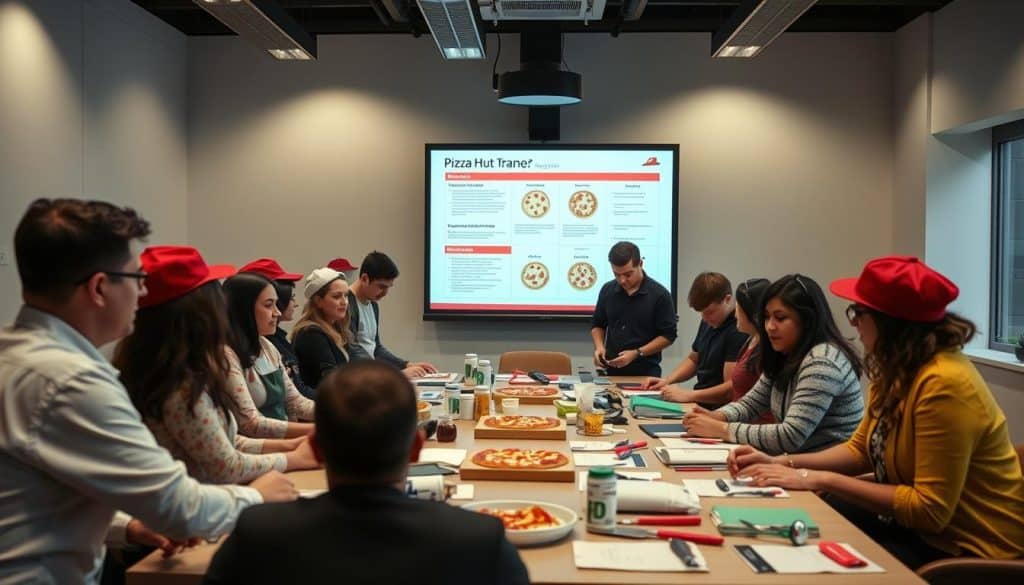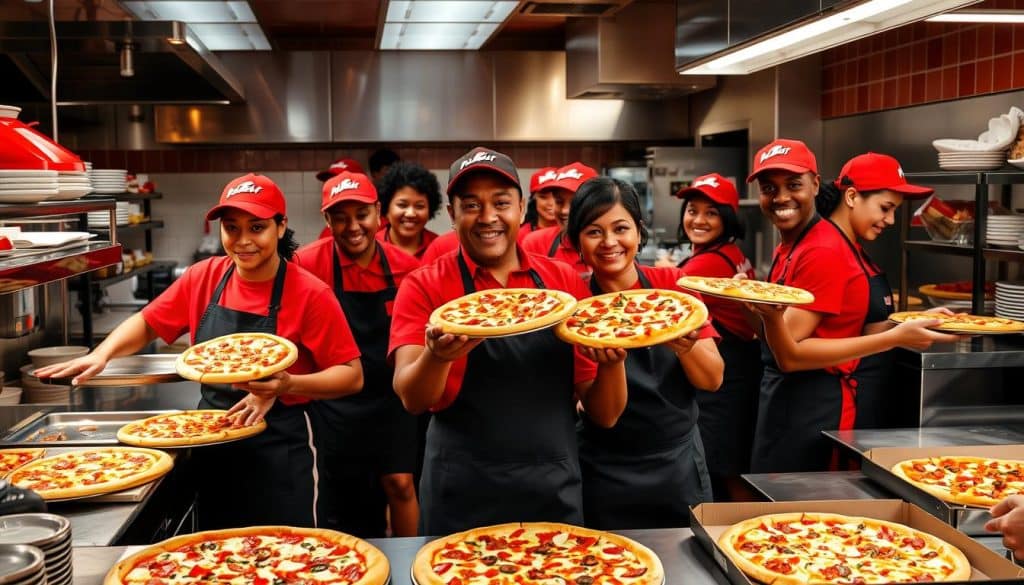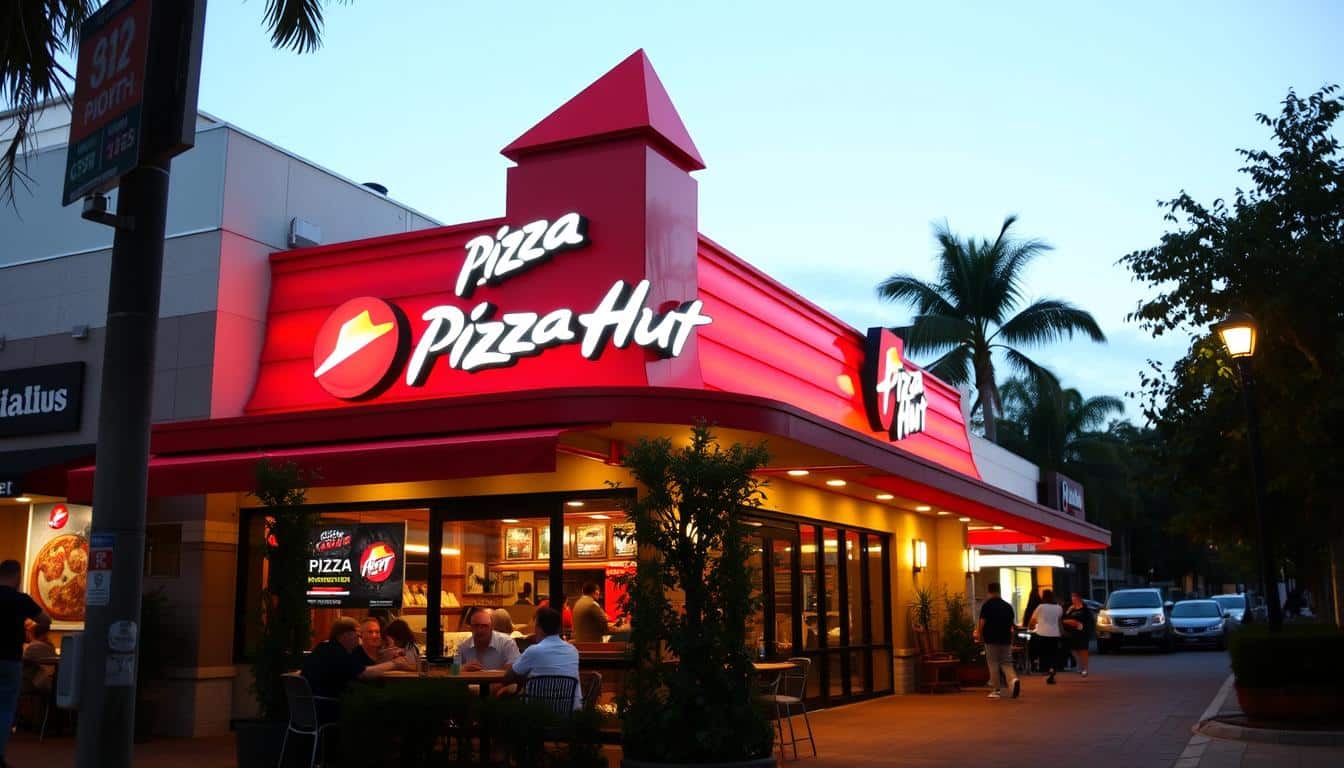Ever thought about why some franchises do well while others don’t? In the fast-casual dining world, starting a Pizza Hut franchise is a tempting option for many. With over 5,300 units in the U.S. and a well-known brand, Pizza Hut offers a strong base for new entrepreneurs. But what’s needed to start a Pizza Hut franchise and succeed? This article will walk you through each step, covering the franchise model’s details and key insights into initial costs, training, and growth.
Key Takeaways
- Pizza Hut boasts a global presence with over 18,000 restaurants as of 2024.
- The initial investment to start a Pizza Hut franchise can range from $782,000 to $2,053,500.
- Franchisees typically enjoy a lower three-year failure rate of 8%, compared to the industry average of 11%.
- Franchise support includes extensive training, marketing resources, and financial assistance options.
- Understanding royalty fees and operational costs is essential for effective budgeting.
Understanding the Pizza Hut Franchise Model
The Pizza Hut franchise model is a special way for entrepreneurs to start their own businesses. They get to use the Pizza Hut name, which has been around for over 60 years. With thousands of locations worldwide, Pizza Hut is known for its quality and customer loyalty.
What is a Franchise?
A franchise is a partnership between the brand owner and the person running the business. The franchisee gets to use the brand’s name and systems. This makes starting a business easier, as they don’t have to build a brand from scratch.
Overview of the Pizza Hut Concept
Pizza Hut focuses on great food and service. Franchisees get training and support from Yum! Brands. This helps them succeed, with only 8% failing in the first three years.
On average, a Pizza Hut franchise makes around $983,000 a year. This shows it’s a profitable choice for entrepreneurs.
Benefits of Owning a Pizza Hut Franchise
Starting a Pizza Hut franchise has many benefits. It comes with a well-known brand and a tested business model. The company also offers ongoing support, which lowers the risk of failure.
Franchisees also enjoy a competitive edge in their area. This is because they have a protected territory. This makes it easier to attract customers and grow their business.
Initial Investment and Costs
Starting a Pizza Hut franchise is a big step with investment opportunities. It needs a lot of money upfront. The Pizza Hut franchise cost varies based on the type and location. You can expect to spend between $412,000 to $2,053,000 to start.
Average Startup Costs
The cost to start a Pizza Hut franchise is usually between $579,000 to $2,053,500. This includes fees, equipment, and property improvements. The initial fee is $25,000, and other costs like building and equipment can add up. Inventory and operational start-up expenses also play a role.
Required Liquid Capital
You’ll need a lot of money to start, between $250,000 to $500,000. You should have at least $700,000 in net worth. This ensures you can handle initial and unexpected costs.
Franchise Fee Breakdown
The fee structure affects your investment. Pizza Hut charges a $25,000 fee and ongoing royalties of 6.0% on sales. You also pay 4.75% for advertising. Knowing these fees helps you understand your long-term financials.
Franchise Application and Approval Process
Starting your journey to own a Pizza Hut franchise involves several key steps. It’s important to know the pizza hut franchise requirements. This knowledge is vital for those aiming to succeed in the competitive food service industry.
Steps to Apply for a Franchise
To apply for a pizza hut franchise, start by filling out an application form on the Pizza Hut franchising website. After submitting, you’ll go through a review. This review checks your background, experience in hospitality, and business skills.
This detailed check ensures you have what it takes to run a successful business. It’s a way to make sure you’re a good fit for the franchise.
Eligibility Requirements
To meet pizza hut franchise requirements, you need experience, financial stability, and a commitment to the franchise model. A net worth of $500,000 to $1,000,000 shows you’re ready for the job. Also, having $250,000 to $500,000 in liquid assets helps cover startup costs.
Timeframe for Approval
The approval process usually takes a few weeks. Pizza Hut carefully reviews each application to keep high standards. Once approved, you’ll get training on operations, marketing, and customer service.
For more information on the application and approval process, visit this resource.
Training and Support for Franchisees
Starting as a Pizza Hut franchisee means a lot of learning. The first part, called “First Slice,” lasts 8 to 12 weeks. It teaches the basics of running a restaurant, like how to manage and market.
During this time, you learn about Pizza Hut’s values and standards. This helps you run your restaurant well.
Initial Training Program
The training covers everything you need to know. You’ll learn about kitchen work, customer service, and managing stock. It’s a key step for those new to pizza franchising.
Getting good training is important. It helps you succeed and avoid problems early on.
Ongoing Support from Pizza Hut
After training, Pizza Hut keeps helping. They offer guidance on running your restaurant. This makes sure you meet the brand’s standards.
This support helps you deal with daily challenges. It lets you focus on giving great service to customers.
Marketing and Operational Assistance
Marketing is key to bringing in customers and sales. Pizza Hut gives franchisees tools to promote their business. This includes ads and a shared advertising fund.
Using Pizza Hut’s marketing helps you grow your business. It makes your restaurant more visible in the community.

Location Selection Considerations
Choosing the right location is key for a Pizza Hut franchise’s success. Several factors influence this choice. Each one is important for attracting customers and boosting sales.
Factors Influencing Site Selection
High foot traffic, visibility, and easy access are must-haves. Neighborhood demographics shape what customers want. This lets franchisees tailor their offerings to local tastes.
Looking at nearby competition helps see if there’s room for success. Knowing the community’s dining habits and preferences is also vital. It helps make a smart choice.
Evaluating Market Demand
Understanding local consumer behavior and needs is essential. Identifying trends and preferences helps in marketing and menu planning. Franchisees should analyze the market to predict sales and create a solid business plan.
Lease Negotiation Tips
Getting a good lease is critical for a franchise’s location. Look for favorable terms like rent cuts or flexible lease lengths. A real estate expert can offer valuable insights on market rates.
Knowing the lease details well can avoid problems and ensure the franchise’s success in the long run.
Establishing Operations and Staffing
Starting a Pizza Hut franchise needs a solid plan for staffing and training. A good team shows Pizza Hut’s dedication to quality service. This makes the customer experience better.
Choosing the right staff is key for Pizza Hut’s success. A detailed hiring process finds people with the right skills and values. This team should be diverse to welcome customers and improve the brand’s image.
Staff Training Expectations
Good training is essential for staff growth. New employees need to learn about Pizza Hut’s standards and customer service. This training keeps them up-to-date with new policies and practices.
Operational Guidelines and Standards
Guidelines help keep all franchises consistent. Following these rules ensures quality and happy customers. Franchisees must know these guidelines well to succeed.

Marketing Strategies for Pizza Hut Franchisees
Marketing is key for Pizza Hut franchises to draw in and keep customers. Franchisees can boost their local presence with smart marketing. Joining local events and running special deals can help attract more people.
Local Marketing Initiatives
Targeted marketing for Pizza Hut can boost sales and build loyalty. Getting involved in the community through events or sponsorships can make a brand shine. Running promotions on big days like the Super Bowl or Halloween can also help.
Using coupons and digital deals can make customers feel appreciated. This keeps both new and loyal customers coming back.
Utilizing Pizza Hut Brand Resources
Franchisees should use Pizza Hut’s marketing tools. These include ads, PR, and branded materials that speak to a wide audience. By matching local efforts with brand campaigns, franchisees can make a stronger impact.
Social Media Engagement
Social media is vital for franchise marketing today. Posting real, high-quality images of food can spark interest and get people talking. Sharing limited-time offers or deals can create a sense of urgency.
Being active on social media boosts visibility and lets franchisees connect with their community. It’s a powerful way to engage and grow.
Understanding Franchise Agreements
Franchise agreements are key for starting and running a Pizza Hut franchise. They have important parts that franchisees need to get. These include fees, where you can operate, and rules to follow.
Looking closely at these parts helps avoid confusion. It also makes sure everyone knows what’s expected.
Key Components to Review
When looking at pizza hut franchise agreements, there are a few things to check. The agreement mentions a $25,000 fee to start. It also talks about how much money you might need, from $412,000 to $2,053,000.
Knowing these costs helps you plan your finances. It’s also important to understand what you’ll have to do and pay for while you’re running the franchise.
Renewal and Termination Clauses
The renewal and termination parts of the agreement are very important. They decide how long you’ll have your franchise. Knowing how to renew is key to keeping your business going.
If the franchise ends, it’s important to know your rights. This helps avoid problems caused by not understanding these parts.
Legal Considerations
Understanding the legal side of a pizza hut franchise is important. It includes knowing about intellectual property and following rules. Franchisees need to know these to protect their investment and keep the franchise’s reputation high.
Talking to a lawyer who knows about franchise law can help. They can explain what you’re agreeing to and what happens if you don’t follow the rules.
Managing Finances and Budgeting
Managing finances well is key to success in franchising. Franchisees must look at sales projections and market analysis to stay profitable. Knowing the local market helps in creating a solid budget for a pizza hut franchise.
Understanding sales figures is important for planning expenses and investments. This helps in making smart financial decisions.
Sales Projections and Market Analysis
Franchisees should use past data and trends to guess sales. They need to think about local competition and what customers like. A good market analysis helps spot chances and hurdles, guiding owners in managing finances.
Budgeting for Ongoing Costs
It’s vital to budget for ongoing costs to keep finances stable. Costs include rent, utilities, food, labor, and marketing. For instance, rent can be $5,000 to $15,000 a month, and utilities $2,000 to $5,000.
Setting aside enough money for these expenses helps in running the business smoothly. It also ensures a solid budget for a pizza hut franchise.
Understanding Royalties and Fees
Franchisees need to understand royalty fees to manage money well. They usually pay 6% of sales as royalties. They also have to contribute to system advertising, which is about 4.75% of sales.
Knowing these fees helps keep finances healthy. It’s important for making the business profitable.
Growth and Expansion Opportunities
Franchisees looking to grow with Pizza Hut have many paths to follow. They can increase their operations to make their business more efficient. This is a key step in opening more locations.
Many are excited about the chance to own more than one Pizza Hut. This can lead to big profits. By improving their business, they can find new ways to grow.
Scaling Your Franchise
To grow a franchise, focus on making your operations better. This means making processes smoother, using new technology, and learning from others. A well-run business is ready to expand.
For example, a smart investment in a sale-leaseback deal helped one owner grow fast. This shows how smart money moves can speed up growth.
Opening Additional Locations
After a franchise is running well, it’s time to look for new places to open. The Grand Mere Restaurant Group has many Pizza Hut locations across states. They even opened a new one in Castle Rock, Colorado, in XX year.
This shows how important it is to pick the right location. Good market research is key to growing your Pizza Hut franchise.
Collaborating with Other Franchisees
Working together with other franchisees is very helpful. They can share tips on running a successful business and marketing. This teamwork can make a big difference in your success.
By working together, you can learn from others. This fits perfectly with Pizza Hut’s goal to grow and be more present in communities.
Success Stories and Lessons Learned
Running a Pizza Hut franchise teaches valuable lessons. Many success stories highlight the importance of quality, great customer service, and community involvement. Owners who know their customers well and use Pizza Hut’s marketing tools often stand out.
Case Studies of Successful Franchisees
Some franchisees have overcome Pizza Hut’s challenges with creative strategies. For example, one owner tailored their menu to local tastes, boosting sales and community ties. This shows how being flexible and customer-focused can lead to success.
Common Challenges and Solutions
Managing a Pizza Hut franchise comes with its own set of problems, like high costs and competition. Yet, many have found ways to overcome these. Using technology for online orders helps save time and money. Building strong supplier relationships and managing inventory well are also key strategies.
Tips for Sustained Success
To thrive in the long run, franchisees must focus on quality and consistency. Training staff and checking operations regularly improves customer happiness. Community events and promotions also build customer loyalty. By focusing on these areas, owners can overcome challenges and achieve lasting success.





